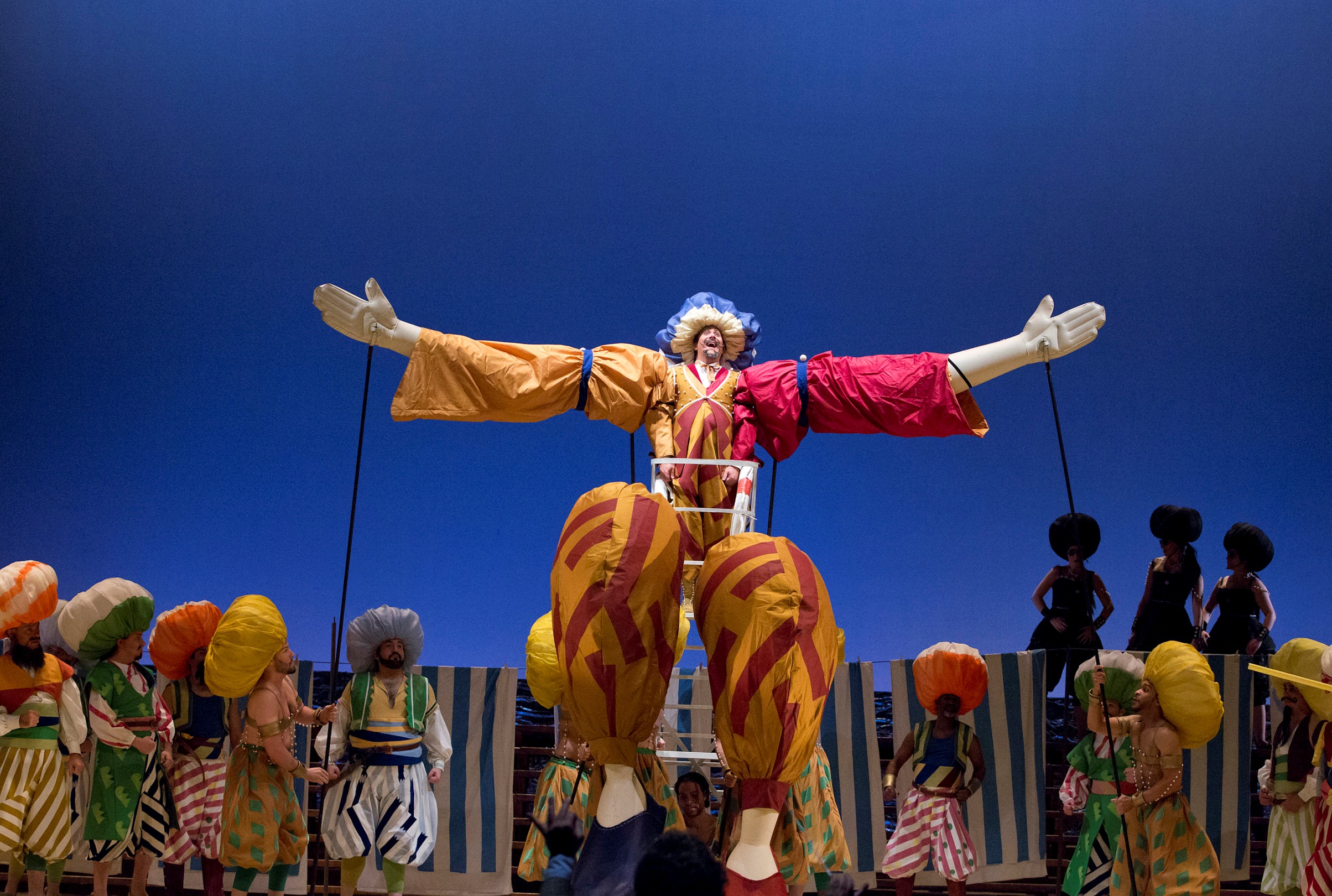The Review Is In
An opera that leaves you laughing: HGO's fresh, feisty Italian Girl in Algiersis anything but limp
 Daniela Barcellona (Isabella) and Daniel Belcher (Taddeo) are held prisoner byRobert Pomakov (Haly) and his corsairs in Act I of Houston Grand Opera’sproduction of The Italian Girl in Algiers.Photo by © Felix Sanchez/Houston Grand Opera
Daniela Barcellona (Isabella) and Daniel Belcher (Taddeo) are held prisoner byRobert Pomakov (Haly) and his corsairs in Act I of Houston Grand Opera’sproduction of The Italian Girl in Algiers.Photo by © Felix Sanchez/Houston Grand Opera Daniela Barcellona (Isabella) is shipwrecked and taken ashore by Robert Pomakov(Haly) and his corsairs in Act I.Photo by © Felix Sanchez/Houston Grand Opera
Daniela Barcellona (Isabella) is shipwrecked and taken ashore by Robert Pomakov(Haly) and his corsairs in Act I.Photo by © Felix Sanchez/Houston Grand Opera Daniela Barcellona (Isabella) celebrates her native Italy in in Act II ofHouston Grand Opera's production of The Italian Girl in Algiers.Photo by © Felix Sanchez/Houston Grand Opera
Daniela Barcellona (Isabella) celebrates her native Italy in in Act II ofHouston Grand Opera's production of The Italian Girl in Algiers.Photo by © Felix Sanchez/Houston Grand Opera Daniel Belcher (Taddeo) is appointed Kaimakan by Patrick Carfizzi (Mustafa) inin Act IIPhoto by © Felix Sanchez/Houston Grand Opera
Daniel Belcher (Taddeo) is appointed Kaimakan by Patrick Carfizzi (Mustafa) inin Act IIPhoto by © Felix Sanchez/Houston Grand Opera Lawrence Brownlee (Lindoro) and Daniel Belcher (Taddeo) give Patrick Carfizzi(Mustafa) the title of Pappataci in Act II of Houston Grand Opera's productionof The Italian Girl in Algiers.Photo by © Felix Sanchez/Houston Grand Opera
Lawrence Brownlee (Lindoro) and Daniel Belcher (Taddeo) give Patrick Carfizzi(Mustafa) the title of Pappataci in Act II of Houston Grand Opera's productionof The Italian Girl in Algiers.Photo by © Felix Sanchez/Houston Grand Opera
The dame, who is known as the flame, of the king, of an underworld ring. He’s an ape, who won’t let her escape! That’s entertainment!
Is it possible Arthur Schwartz and Howard Dietz had Rossini’s The Italian Girl in Algiers in mind when they wrote that classic Hollywood number back in 1952?
The striking first impression of this second production of Houston Grand Opera’s new season is just that: Entertainment. Unconditionally appealing and often hilarious, this vivid staging from Spain’s talented Els Comediants is wonderfully fresh, with a bounty of glorious singing.
H is voice is a like a dry Chablis to another man’s sweet Sauterne, and I’ll take the former.
At the heart of the show, and this is definitely a show, is a genius trio: director Joan Font (founder of Els Comediants), satirical cartoonist and set and costume designer Joan Guillén, and lighting designer Albert Faura, in their third appearance at HGO after similarly-inspired productions of Rossini’s Cinderella and The Barber of Seville. Here’s hoping they will return time and again for anything they’d like to tackle, for they are among the most important voices in contemporary opera production.
An evening from these three is filled with activity from start to finish. While flowery recitatives, insistent arias and rich ensemble passages are offered, something fascinating is simultaneously transpiring. A forlorn Italian slave plays with a paper boat as he dreams of his distant ex-lover.
In a later scene, he builds sand castles while delivering his aria. The lord of the harem packs his wife’s suitcase while he sings her back to Italy; the sultry Italian girl changes into her bathing outfit during her aria, plates of spaghetti are served by the men’s chorus, and on and on. There is a never a boring moment during the two-act, nearly three-hour performance. In some cases, you have to work to try and catch it all.
A Masterful Touch
The imagery is also rich with archetype, often forming a clever parody of something contained in the libretto. The jealous Taddeo transforms into an enormous puppet (a task requiring much of the men’s chorus) as he is being manipulated by Mustafà. When the glory is Italy is celebrated in song, a gigantic bottle of Chianti, in the form of a battle cannon, appears. No spoilers, you have to see what happens with the Chianti to believe it.
Wouldn’t all this activity and imagery seem more than the opera could bear? On the contrary, the flurry of events is somehow liberating to the singers.
It was a mannerism of directors such as Peter Sellars and Robert Wilson to engage singers with some stage action seemingly unrelated to the score. There is danger, of course, in that this can be a useless distraction. Font, however, uses a light but consistent touch. The singers seem to delight in the tasks at hand, making them less self-conscious about the intricacies of the difficult bel canto score.
Conductor Carlo Rizzi demonstrated impressive command in just the first few pizzicato phrases of the overture. We last heard him in The Queen of Spades of the 2010 season, and it’s wonderful to have him back. The Italian Girl has a longish overture, clearly influenced by Haydn’s Surprise Symphony, perhaps not as remarkable as many of Rossini’s best overtures, but last night given such a precise and compelling interpretation that the house fell silent where it is often busy talking and settling in for the night.
Font uses a light but consistent touch. The singers seem to delight in the tasks at hand, making them less self-conscious.
Rizzi brought color and sophistication at every turn throughout the evening, offering a certain transparency, so that one could hear every instrument with complete clarity. Special mention should be made of Bethany Self’s expert pianoforte accompaniment of the recitative passages, elegant and sort of pre-romantic in their rich flourishes. She contributed greatly to the fascinating shift in color and mood.
Mezzo-soprano Daniela Barcellona is somewhat typecast in this opera, since she just happens to be a beautiful Italian girl. Of course, one should say more appropriately that she is a woman, but here she gives such a youthful impression it’s difficult not to think of her as a girl.
This is quite an exciting HGO debut, demonstrating a stunning command of the role, which she has sung in Rome, Dresden, Munich, Bilbao, and Oviedo. The voice is sturdy, expressive, and her acting deeply comic.
Singing Hurt
Tenor Lawrence Brownlee injured himself Friday in rehearsal, not vocally, but spraining a muscle in his leg. Before the overture, HGO managing director Perryn Leech announced that Brownlee’s noticeable limp was not part of the stage direction.
“But if you applaud him,” he added, “he’ll be very appreciative.”
Strangely, the limp seemed to work well for his entrance, where as the Italian slave Lindoro he is bound by an enormous ball and chain.
Strangely, the limp seemed to work well for his entrance, where as the Italian slave Lindoro he is bound by an enormous ball and chain. At the conclusion, the roaring applause seemed more in response to his golden singing. Last year, some readers gave me a hard time for raving about him in HGO’s The Barber of Seville. I’ll admit that he has a somewhat dry, astringent quality to his singing, perhaps with a focus more in the head where some listeners would prefer to hear it coming from his chest and abdomen.
His voice is a like a dry Chablis to another man’s sweet Sauterne, and I’ll take the former. His phrasing is perfection and the pitch, crazy good. He is a singer who states his case without second guessing himself, stunning in this role.
We’ve seen bass-baritone Patrick Carfizzi at HGO many times. Last season he was Dr. Bartolo in The Barber of Seville and also Figaro in The Marriage of Figaro. As Mustafà, the portly bey (traditionally, a chieftain or “lord” of a somewhat lesser tribe) of Algiers, he is supposed to be ugly as well. In one aside, Isabella exclaims he has the face of a camel. It’s difficult to think of him as unattractive, and his singing is amazingly resonant, filling the hall last night with a wonderful insistence.
He is hysterical throughout, seven times larger in a costume that it almost a set, slurping spaghetti in the second act with convincing gusto.
There isn’t a bad voice in the entire cast. Daniel Belcher gives a vigorous interpretation of the comic Taddeo, nearly dancing throughout the incredible bell-and-drum number at the end of the first act. Lauren Snouffer’s Elvira and Carolyn Sproule’s Zulma are equally humorous and expert, making for a rousing series of ensembles throughout.
The second act finishes with some rumination on the concept of Pappataci, more commonly known as a fever caused by a blood virus. Well, that’s one meaning. Here it is evoked in a very different way, and you’ll miss something profoundly comic if you don’t go and experience it for yourself.



